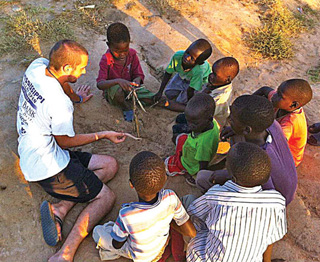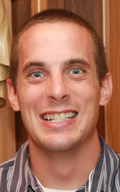By Celine Klosterman

DAVENPORT — In pursuit of God’s plan, Luke Ebener traded a job as a financial advisor for a year of teaching English in South Sudan.
Since returning to Iowa earlier this month, the 26-year-old has started working as coordinator of youth
and young adult ministry at St. Paul the Apostle Parish, a job that reflects the calling he’s discerned to service.
A graduate of St. Ambrose University in Davenport with a degree in finance, he began to feel the Lord encouraging him to do something more in December 2011. That month, he attended Mass in Springfield, Ill., near his hometown of Chatham. During the Mass, Luke’s mother recognized the lector as the nurse who’d served as head of the neonatal care unit at the hospital where he’d been born three months prematurely — with a 5 percent chance of survival. After the liturgy, the retired nurse shared stories with the Ebeners about Luke’s birth, and he realized: “God kept me alive. I knew he must’ve had a plan for me. Was I fulfilling it? I couldn’t honestly say yes.”
That encounter sparked months of prayer, discernment and discussions with family and friends. A volunteer at the Oaks of Mamre Catholic Worker House in Davenport, he considered becoming a full-time Catholic Worker. But ultimately he settled on a volunteer opportunity with the Salesian Lay Ministers, much of whose work involves youths and education. He said the order’s ministry fits with his background; he has worked at a daycare and summer camp, coached youth sports, and volunteered in youth ministry at Our Lady of Victory Parish in Davenport. “With both my parents working in education, it’s in my blood.”
So Luke left his position at MassMutual Financial Group in Davenport and, after three weeks of orientation with the Salesians, traveled in September 2012 to South Sudan. There the Salesians run a secondary school where Luke had been assigned to teach English in the village of Gumbo, near the nation’s capital of Juba.

“The first week or so that you’re there, you’re kind of in a honeymoon period,” he said. “Then frustrations start to sink in.” Having received little training specific to his assignment, he questioned the difference he was making for his 28 students, who were mostly Arabic-speaking refugees aged 14-32.
After growing up under a corrupt government with a dysfunctional public education system, they had anywhere from a fourth- to seventh-grade level of education.
But the Salesian community gave Luke advice and reassurance. Living nearby were his site partner Tom Kelly and up to a dozen other volunteers from around the world, plus several local priests and pre-novices.
There were plenty of Sudanese students — including primary school boys — to spend time with outside of class, too. “One of the things that drew me to the Salesians was their emphasis on presence — being with and for youths,” Luke said. He tried to provide that ministry of presence, often during impromptu games of soccer or basketball.
“His strengths in the classroom were his ability to find new and exciting ways to keep his students involved and interested in learning, and his constant presence,” Tom said. “When playing with the children, again he was dedicated and never missed a day. He always had a smile on his face and was able to interact with all ages — playing basketball, tag or just giving his signature high five to everyone who passed by. He was a dedicated and selfless worker who never complained despite the difficulties.”
Luke hopes he helped students understand there’s a different way of life from the war-torn, violent culture they’ve known. “We’ll see what God does with the seeds I planted.”
His time in South Sudan strengthened his commitment to peace, social justice and Catholicism, he said. “I fell in love with my faith even more. We’d say morning and evening prayer every day, and pray the rosary with 200-300 people in three or four different languages. I had been going to daily Mass before going to South Sudan, but there I continued that.”
While there, he considered whether to continue overseas service after his one-year term. Ultimately, though, he realized his calling to full-time youth ministry. “I thought that even if I devoted all my free time to that, it wouldn’t be enough. But I’ll always be a missionary. That’s never going to change.”
South Sudan’s origin
According to the United Nations:
From 1898-1955, Britain and Egypt occupied Sudan, with separate administrative arrangements for the north and south. Sudan gained independence in 1956 and faced long civil wars in the following decades.
On Jan. 9, 2011, southerners opted to separate from the north by more than 98 percent of a vote. Six months later, on July 9, the Republic of South Sudan was born.
Of the 8.3 million people in South Sudan, 2.4 million are food insecure. Only 10 percent of children complete primary school, and 84 percent of women cannot read or write.








